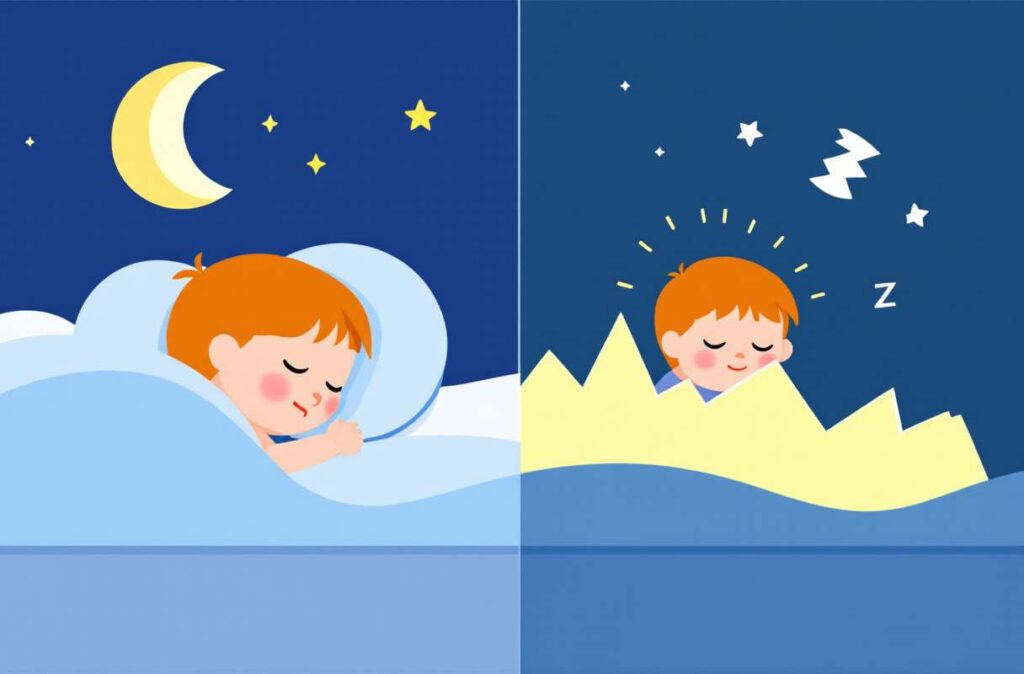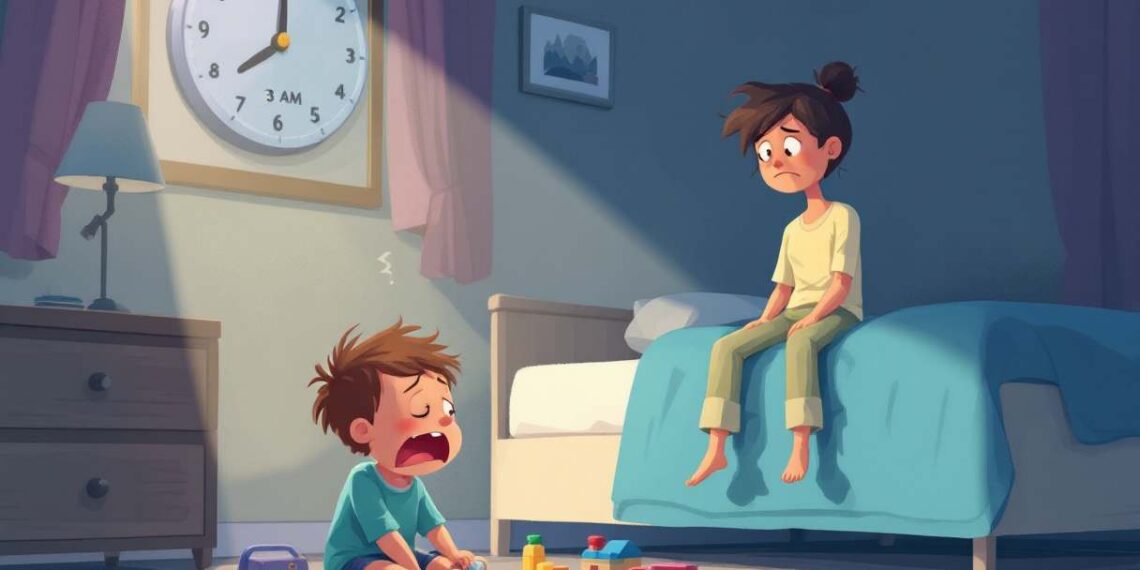Sleepless nights, cranky days, and a toddler who suddenly treats bedtime like it’s an Olympic sport? Welcome to the wild world of toddler sleep regression! Just when you thought you had this parenting gig figured out, your little one decides to rewrite the rulebook on shut-eye. But don’t worry frazzled parents – you’re not alone in this twilight zone of toddlerhood. In this guide, we’ll unpack the mysteries of sleep regression, explore its sneaky causes, and arm you with strategies to survive (and even thrive) during this challenging phase. So grab a cup of coffee (you’ll need it) and let’s dive into the land of toddler sleep struggles and solutions.
The Rollercoaster of Toddler Sleep
Raising a toddler often feels like you’re strapped into a topsy-turvy ride at an amusement park, especially when it comes to their sleep habits. Many families encounter the unpredictable ups and downs of sleep regression as their kiddos grow.
Understanding Sleep Regression in Toddlers
So, what’s the deal with toddler sleep regression? It’s that phase when a little one who once snoozed soundly suddenly starts having a rough time catching those Z’s. They’re waking up more, fighting sleep like it’s the enemy, or suddenly loathing naps. This can hit out of nowhere but often coincides with major growth spurts or life shifts.
During these sleepy-time struggles, parents might see their normally easy-going toddler turning into a pint-sized bundle of nerves or acting out more than usual. The silver lining? This rocky patch is usually just a temporary blip on the radar.
Common Causes of Toddler Sleep Regression
Why won’t they sleep? There are quite a few culprits behind toddler sleep regression. Here’s a little cheat sheet of common causes along with typical ages you might see these happening:
| Cause | Age Range (Months) | What’s Going On |
|---|---|---|
| Growth Spurts | 9-12, 18-24 | They’re ravenous and it messes with their sleep schedule. |
| Developmental Milestones | 12-18 | Excitement and jitters from newfound skills like walking or chatting can keep them up. |
| Illness | Varies | Even small bugs can throw off their routine. |
| Changes in Routine | Varies | Big life changes, like starting daycare, can disturb sleep. |
| Teething | 6-24 | Sore gums mean restless nights. |
| Nightmares | 2-4 | That monster under the bed? It’s suddenly very much real at night. |
These sneaky causes highlight how a toddler’s sleep is like a kaleidoscope—ever-changing as they grow physically, emotionally, and mentally. Parents who grasp what’s rattling the sleep cage can better help their kiddos through those tricky times. Want to learn more about sleep at different ages? Check out our pages on newborn sleep patterns or preschooler sleep habits.

“Sleep regressions are a normal part of development and often coincide with significant physical or cognitive milestones. Understanding these causes can help parents navigate this challenging phase with more patience and insight.” – Dr. Jodi Mindell, Associate Director of the Sleep Center at Children’s Hospital of Philadelphia
Signs of Toddler Sleep Regression
Ah, sleep regression – that hair-pulling phase where even the dreamiest toddler turns into a midnight marauder. For both little ones and their weary guardians, spotting the signs early is like finding a magic wand (or at least a little relief).
Changes in Sleep Patterns
When sleep regression hits, your toddler’s sleep schedule might start doing an awkward dance. Here’s a look at what you might notice:
| Change in Sleep Pattern | Description |
|---|---|
| Waking Up a Lot More | Your little one may start holding secret nighttime parties. |
| Trouble Getting to Sleep | Bedtime can suddenly feel like convincing a cat to take a bath. |
| Nap Time Shrinkage | Snooze sessions might get shorter or even become extinct. |
| Sleep Fight Club | Your toddler may start objecting to bedtime like it’s a bad date. |
If you’re witnessing this sleep chaos, it might be time for a new bedtime story or a soothing lullaby playlist. Small calming rituals can wave the white flag in this snooze battle.

Behavioral Changes
Watch out for shifts outside of sleep, too, because when clocks go screwy, behavior often tags along for the ride. Here’s what’s in the toddler mood diary:
| Behavioral Change | Description |
|---|---|
| Grumpy Grumps | Expect some sour moods as they deal with the lack of shut-eye. |
| Velcro Kid | Your little one might stick to you like a shadow, fearing separation. |
| Bouncing Energizer Bunny | Sometimes, all that tiredness bursts into extra antics. |
| Eating Quirks | You might see sudden love or hate for picky morsels. |
All these antics are your toddler trying to make sense of the world, one sleepless night at a time. Not every behavior is you-know-who’s doing – they’re just figuring things out in their own peculiar way. Staying calm and supportive is going to be your best move. Need more tips? Check out how to juggle screen time and sleep and peek into preschooler sleep habits for some sanity-saving ideas.

Coping Strategies for Parents
Dealing with toddler sleep regression can feel like trying to keep sand in a sieve – tough, but not impossible. With some handy coping strategies, this bumpy ride can be smoothed out for both the toddler and the harried parents. Here are some tricks to try.
“Consistency is key when it comes to managing sleep regressions. A predictable bedtime routine and a calm sleep environment can work wonders in helping toddlers feel secure and ready for sleep, even during turbulent times.” – Dr. Craig Canapari, Director of the Yale Pediatric Sleep Center
Consistent Bedtime Routine
Building up a steady bedtime routine can be as comforting as your favorite pajamas and hot cocoa. When kids know bedtime is coming, they feel more at ease. A well-rehearsed routine might look like this:
| Activity | How Long? |
|---|---|
| Bath time | 10-15 minutes |
| Storytime | 10-15 minutes |
| Cuddling or quiet time | 5-10 minutes |
| Sleep encouragement | 5 minutes |
Sticking to this routine nightly can provide a sense of stability, easing the little one’s mind during those tougher sleep nights. For helping hands on how to tailor sleep routines for kids of all ages, check out our guides on newborn sleep patterns and preschooler sleep habits.
Creating a Relaxing Sleep Environment
A calm sleep zone is like a lullaby without words. A few tweaks can turn your child’s room into a dreamland retreat:
- Darkness: Blackout curtains can help block out the sun when it’s time for mid-day naps.
- Cool air: Keep the room pleasantly cool but not so much that you can see your breath.
- White Noise: A little white noise can hush the hustle outside your window.
Here’s a simple checklist to create an ideal sleep environment:
| Element | What to Aim For |
|---|---|
| Room Lighting | Nice and dim |
| Room Temperature | 68-72°F (20-22°C) |
| Noise Level | White noise if needed |
| Bedding | Snuggly and soft |
These little changes can transform a bedroom into a cozy, sleep-friendly haven.
Addressing Developmental Milestones
There’s always a fresh trick up a toddler’s sleeve, like learning to walk or finally saying “cookie” instead of “gurgle.” With big milestones often come sleep hiccups. Parents should remind themselves this is all part of the growing-up gig. Here’s what might help:
- Extra hugs and lots of love to reassure your tot.
- More chill-out time during the day keeps crankiness in check.
Knowing that these bumps are just that – bumps – helps everyone take a deep breath and relax. For more about how sleep shifts along with life’s stages, take a peek at our stories on pregnancy sleep changes and teenage sleep deprivation.
Arming yourself with these insights and tricks empowers parents to tackle toddler sleep regression like pros, helping the entire family catch some much-needed z’s.
Adjusting Expectations
Wrangling toddler sleep regression feels like training for a sleep-deprivation marathon. Lowering those high parental expectations a bit might just save sanity and offer a bit of peace for the household. Knowing when to throw up the white flag and take a moment for ‘you’ can make all the difference in weathering this wacky toddler phase.
Knowing When to Seek Help
Sure, toddler sleep drama is all part of growing up, but sometimes it’s time to call in the big guns—professionals, that is. Here’s when you might need to sound the alarm:
| When to Call for Backup | What’s Really Going On |
|---|---|
| Sleep Gone South Permanently | If sleep issues stretch beyond a harmless few weeks. |
| Little Ones Acting All Sorts of Wild | Tantrums on steroids or sleep-related fears that mess up routines. |
| Strange Bedtime Symptoms | Stuff like fever, snoring, or breathing hiccups during the snooze hours. |
| Can’t Get Your Act Together | Even your best sleep tricks aren’t cutting it anymore. |
Feel free to hit up the pediatrician or a sleep expert—don’t be shy about it. Early action means you could get some nifty strategies to make nights less fight-y and more sleepy.
Importance of Self-Care for Parents
Keeping up with a toddler’s sleep antics feels like running a never-ending obstacle course. So, don’t forget to put the spotlight on taking care of Numero Uno—yes, that’s you. Here’s how you can throw yourself a lifeline:
- Gather Your Crew: Call your besties and family, because sharing is way more than caring—it’s healing.
- Steal Some Me-Time: Sneak a little personal downtime into your week for recharging, be it through a little hobby time or just kicking back.
- Mindfulness Magic: Dabble in something chill like meditation or a bit of deep breathing to keep stress at bay.
- Master the Art of Napping: Try to schedule some zzz’s for yourself whenever you get the chance.
Keeping your own sanity in check lets you tackle the toddler sleep circus with a little less flare and more finesse. For a deeper dive into catching those elusive Zs, check out our piece on improving sleep naturally. Exploring how sleep gremlins morph across different ages might help too, like learning about preschooler sleep habits or tackling teenage sleep deprivation.
Working with Healthcare Pros
When your tiny human hits a sleep regression, it can be a real headache for parents. But chatting with health pros can help sort these hiccups out and get everyone snoozing like champs again.
Chatting with a Pediatrician
Seeing a pediatrician is usually step one when you’re dealing with a toddler who’s suddenly anti-sleep. These docs can figure out if the whole no-sleep thing is normal or if there’s something else going on. They’ll clue you in on what’s happening development-wise with your kiddo, notice any behavior flips, and squash any scary health concerns.
When you’re there, they’ll probably want to know about:
| Topic | What to Share |
|---|---|
| Sleep routine | What’s changed about their sleep—how much, how often, or how hard it is to get ’em down |
| Behavior shifts | If they’re crankier than normal, having more tantrums, or the mood swings are nonstop |
| Day-to-day stuff | A quick rundown of what their day looks like, like naps and chow times |
Pediatricians might toss out some good-to-try strategies that match your kiddo’s needs. Plus, they can check for sleep disorders and see if there’s a need for extra help or a game plan.
Getting Some Input from Sleep Specialists
If your little keeps tossing and turning after you’ve tried the basics, talking to a sleep specialist could be the way to go. These sleep gurus dig into sleep stuff and cook up plans just for your kid.
Here’s some stuff sleep specialists do:
| Service | What It’s About |
|---|---|
| Sleep checks | They might run a sleep study to get the lowdown on what’s happening while they sleep |
| Behavior tips | Tricks to get better sleep habits going and nail down a good routine |
| Parent lessons | Sessions where you pick up how-to’s for tackling sleep tech and grasping your kid’s sleep needs |
Hanging with sleep specialists gets parents smart, research-backed tactics fit for your tot. They can also dish out advice on dodging meds to get the Zs happening.
Taking on sleep stumbles with health pros can seriously lighten the load for parents. They’ll arm you with the know-how to help your tyke snag those sweet dreams. Curious about sleep trends for different ages? Check out our reads on newborn sleep patterns and preschooler sleep habits.
Supporting the Whole Family
Tackling toddler sleep regression is more than just a nighttime hiccup—it shakes up the whole family circus. Siblings and partners play big roles in riding out this wild sleep wave together.
Sibling Dynamics and Sleep
When one tot decides to rock the sleep boat, everyone on board—sibling included—feels the waves. Parents need to watch for signs that siblings are getting the short end of the stick and help ’em out. Feeling sidelined or green with envy? That might be your kiddo when their little brother or sister hogs the nighttime spotlight. Dive into these strategies:
| Strategy | Description |
|---|---|
| Talk It Out | Chat openly with siblings about what’s up with their toddler bro or sis needing extra late-night TLC. |
| One-on-One Time | Block out special moments during the day, just you and them, to show they’re in the spotlight too. |
| Join the Herd | Let siblings join in the bedtime routine with quiet activities that ease everyone into the snooze zone. |
With a bit of empathy and inclusion, siblings won’t feel like outsiders in the nighttime drama. For the inside scoop on growing kids’ sleep needs, check out our article on preschooler sleep habits.
Partner Support during Sleep Regression
Tag-teaming with your better half during sleep regression is gold for keeping things chill at home. Chatting about the nighttime action and splitting the kid duty workload keeps stress down and family vibes up. Here’s how to tag-team it:
| Tip | Description |
|---|---|
| Catch-Up Chats | Have sit-downs to hash out how the toddler’s sleep saga is unfolding and tweak your approach. |
| Task Shuffle | Take turns dealing with the night-time circus; one does bedtime while the other catches some Zs. |
| Chill Time | Give each other the green light for alone time to keep your batteries charged through toddler chaos. |
Rolling as a duo not only steadies the ship for your little night traveler but adds a splash of harmony to the fam’s nightly grind. Curious about how sleep evolves? Peep at our reads on pregnancy sleep changes and teenage sleep deprivation.
Lending a hand to one another and tending to every family member’s needs makes riding out the toddler sleep rollercoaster a breeze.
Conclusion:
Toddler sleep regression may feel like a never-ending rollercoaster, but remember – this too shall pass. By understanding the causes, recognizing the signs, and arming yourself with coping strategies, you can navigate this challenging phase with confidence. Whether it’s sticking to a consistent bedtime routine, creating a sleep-friendly environment, or seeking professional help when needed, you have the tools to guide your little one back to dreamland. Don’t forget to take care of yourself and your family in the process. With patience, persistence, and a lot of love, you’ll all emerge from this sleep saga stronger and well-rested. Sweet dreams are on the horizon – hang in there, super parents!
FAQs with answers:
Q1: How long does toddler sleep regression typically last?
A1: Toddler sleep regression usually lasts anywhere from 2-6 weeks. However, every child is different, and some may experience shorter or longer periods of sleep disruption.
Q2: Can teething cause sleep regression in toddlers?
A2: Yes, teething can definitely cause sleep regression in toddlers. The discomfort and pain associated with new teeth coming in can disrupt sleep patterns and make it harder for your little one to fall or stay asleep.
Q3: Should I avoid naps during sleep regression?
A3: No, it’s best to maintain regular nap schedules during a sleep regression. Overtiredness can actually make nighttime sleep worse. Stick to age-appropriate nap routines to help balance your toddler’s sleep needs.
Q4: Is it okay to co-sleep during sleep regression?
A4: While co-sleeping might provide temporary relief, it’s generally recommended to maintain consistent sleep habits. Instead, try comforting your toddler in their own bed to avoid creating new sleep associations that may be hard to break later.
Q5: When should I consult a doctor about my toddler’s sleep issues?
A5: Consult a pediatrician if sleep problems persist beyond 4-6 weeks, if your child shows signs of breathing issues during sleep, or if sleep disruptions are severely impacting your child’s daytime behavior or family functioning.
Additional resources
Mayo Clinic: Child Sleep: Put Preschool Bedtime Problems to Rest
Sleep.org: Understanding Sleep Regression in Toddlers
Zero to Three: Sleep Challenges: Why It Happens, What to Do









Hello.
Good cheer to all on this beautiful day!!!!!
Good luck 🙂